This article describes the content of OpenSTLinux distribution software release version ecosystem release v6.1.0 ![]() , which is part of the STM32 MPU ecosystem release note - v6.1.0.
, which is part of the STM32 MPU ecosystem release note - v6.1.0.
1. Intended audience[edit | edit source]
The targeted audience is STM32MP1 series and STM32MP2 series customers or partners.
2. Delivery scope and purpose[edit | edit source]
The OpenSTLinux distribution is a Linux® distribution based on the OpenEmbedded build Framework. It runs on the Arm® Cortex® processors, and is a fundamental part of the STM32MPU Embedded Software distribution. This delivery of OpenSTLinux distribution is part of STM32 MPU Ecosystem v6.1.0 (see the STM32 MPU ecosystem release note - v6.1.0).
3. Licensing[edit | edit source]
This software package is licensed under a LIMITED LICENSE AGREEMENT FOR ST MATERIALS EVALUATION (LLA). Customers may not use this package except in compliance with the software license agreement (SLA).
All packages use the same source components. All components and their respective licenses are listed here.
4. Supported hardware[edit | edit source]
This software delivery is compatible with the following boards:
| STM32MP13 boards | |||
|---|---|---|---|
| Boards | PCBs list | Main features | Ordering |
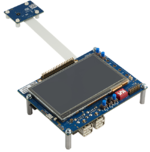 STM32MP135F-DK Discovery kit |
|
|
|
| STM32MP15 boards | |||
|---|---|---|---|
| Boards | PCBs list | Main features | Ordering |
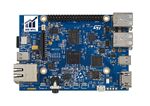 STM32MP157D-DK1 Discovery kit |
|
|
|
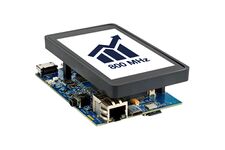 STM32MP157F-DK2 Discovery kit |
|
|
|
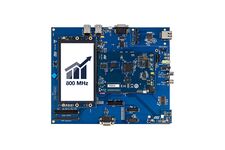 STM32MP157D-EV1 Evaluation board |
|
|
|
 STM32MP157F-EV1 Evaluation board |
|
|
|
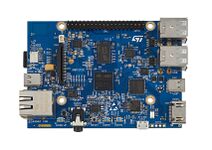 STM32MP157A-DK1 Discovery kit |
|
|
Out of production |
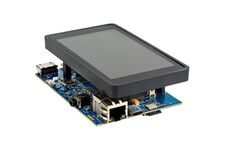 STM32MP157C-DK2 Discovery kit |
|
|
Out of production |
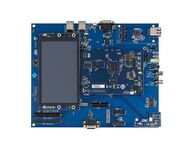 STM32MP157A-EV1 Evaluation board |
|
|
Out of production |
 STM32MP157C-EV1 Evaluation board |
|
|
Out of production |
| STM32MP21 boards | |||
|---|---|---|---|
| Boards | PCBs list | Main features | Ordering |
 STM32MP215-DK Discovery kit |
|
|
|
| STM32MP23 boards |
|---|
| STM32MP25 boards | |||
|---|---|---|---|
| Boards | PCBs list | Main features | Ordering |
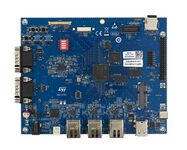 STM32MP257F-EV1 Evaluation board |
|
|
|
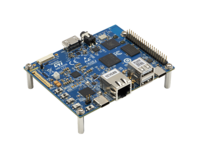 STM32MP257F-DK Discovery kit |
|
|
|
5. Release content[edit | edit source]
5.1. Main software components[edit | edit source]
- Build process
- OpenEmbedded v5.0.8 (Scarthgap) - Updated
- GCC version v13.3.0
- Embedded software components
- Linux kernel v6.6-stm32mp-r2 (v6.6.78) - Updated
- TF-A v2.10-stm32mp-r2 - Updated
- U-Boot v2023.10-stm32mp-r2 - Updated
- OP-TEE v4.0.0-stm32mp-r2 - Updated
- External DT v6-stm32mp-r2 - Updated
- OpenOCD version v0.12.0
- Applicative components
- Weston version v13.0.1
- Wayland version 1.22.0
- GStreamer version v1.22.12
- GCnano version v6.4.21 - Updated
5.2. Changes[edit | edit source]
5.2.1. OpenSTLinux layers[edit | edit source]
Changes are:
- Rebase on Yocto Release 5.0.8 (Scarthgap)
- Add support of STM32MP21x lines

- Add support of M33-TD flavor

- New machine stm32mp2-m33td (applicable on STM32MP215F-DK Discovery kit
 and STM32MP257F-EV1 Evaluation board
and STM32MP257F-EV1 Evaluation board  )
) - Supported storage:
- nor-sdcard (CM33 boots on nor, execute CA35 boots on sdcard and opestlinux is started from sdcard)
- nor-emmc (CM33 boots on nor, execute CA35 boots on emmc and openstlinux is started from emmc)
- sdcard (CM33 boots on sdcard, execute CA35 boots on sdcard and openstlinux is started from sdcard)
- emmc (CM33 boots on emmc, execute CA35 boots on emmc and openstlinux is started from emmc)
- nor-nor-sdcard (CM33 boots on nor, execute CA35 boots on nor and openstlinux is started from sdcard)
- New machine stm32mp2-m33td (applicable on STM32MP215F-DK Discovery kit
- Others:
- SDK: support of an aggregated developer package (one developer package for stm32mp1, stm32mp2, stm32mp2-m33td)
- M33 coprocessor: support of signed/encrypted firmware verified at runtime by OTP key
- M33 firmware: split of recipe to support m33 coprocessor mode or boot processor mode (m33project-stm32mp2 vs m33tdproject-starter-stm32mp2)
- Usage of linux-firmware-addons-bcm43xx for support of wifi/bt on ST Board
- STM32MP215F-DK Discovery kit
 : wifi/bluetoth is on M2 connector and managed at runtime via device tree overlay (via menu on U-BOOT)
: wifi/bluetoth is on M2 connector and managed at runtime via device tree overlay (via menu on U-BOOT)
- Minor fixes
5.2.2. Linux kernel[edit | edit source]
New component release tag v6.6-stm32mp-r2 is available.
The main features updated are:
- Rebased on Linux® kernel v6.6.78 for OpenSTLinux v6.1.0 delivery
- Add STM32MP21x lines
 support
support - Add support of STM32MP215F-DK Discovery kit

- Add AARCH32 mode support for STM32MP2 series
- Stabilization and optimization of STM32MP1 & STM32MP2 platforms
- Improvements for real-time, power management, performance
- Multimedia enhancements
- Minor fixes
5.2.3. U-Boot[edit | edit source]
New component release tag v2023.10-stm32mp-r2 is available, rebased on official U-Boot v2023.10.
Changes are:
- Add STM32MP21x lines
 support support
support support - Add Add support of STM32MP215F-DK Discovery kit

- Add AARCH32 mode support for STM32MP2 series
- Add PWM support with timer for STM32MP2 series
- Add STM32 USB2-FEMTO PHY support
- Add multi-function timer driver support for STM32MP2 series
- Add support of ADAC-PKH, RPROC-FW-KEY and ADAC-PKH for cmd_stm32key
- Add BSEC driver support for STM32MP2 series
- Fix large image programming issue
- Various fixes
5.2.4. TF-A[edit | edit source]
New component release tag v2.10-stm32mp-r2 is available, rebased on official TF-A v2.10 (LTS tag lts-v2.10.15).
Changes are:
- Rebase on LTS-v2.10.13
- Add support of STPMIC1L and STPMIC2L
- BL33 now boot on EL2 by default
- add support of HDPL for STM32MP21x lines

- Multiples fix and improvement
Full changelog: lts-v2.10.13...2.10-stm32mp-r2
5.2.5. OP-TEE[edit | edit source]
New component release tag 4.0.0-stm32mp-r2 is available, rebased on official OP_TEE OS 4.0.0.
Changes are:
- STM32MP release 4.0.0-stm32mp-r2 :
- Add STM32MP21 SoCs support
- Add STM32MP21 DK board
- Add support of RPROC firmware decryption
- Update EXTI to use interrupt framework
- Rework counter framework
- Other minor updates
Full Changelog: 4.0.0-stm32mp-r1.2...4.0.0-stm32mp-r2
5.2.6. External-DT[edit | edit source]
New component release tag v6-stm32mp-r2 is available to take into account rebase of OpenSTLinux V6.1.0.
The external device tree component is used to host STM32 MPU embedded software device tree configurations in addition of the ones present in each software component (TF-A, OP-TEE, U-BOOT, LINUX, TF-M).
Since this ecosystem release v6.1.0 ![]() , it is used for both STM32MP1 series and STM32MP2 series.
, it is used for both STM32MP1 series and STM32MP2 series.
6. Release change notification[edit | edit source]
OpenSTLinux attention points to switch from ecosystem release v6.0.0 ![]() to ecosystem release v6.1.0
to ecosystem release v6.1.0 ![]() are documented in STM32 MPU OpenSTLinux release changes notification – v6.1.0 article.
are documented in STM32 MPU OpenSTLinux release changes notification – v6.1.0 article.
7. Recommendations for use[edit | edit source]
7.1. Safe use[edit | edit source]
- Flash programming and boot from all supported flash devices: SD card, eMMC, ONFI NAND and NOR flash memories.
- Develop Linux® applications, libraries, kernel modules based on OpenSTLinux delivery.
- Develop coprocessor Cube applications based on STM32CubeMP1 and STM32CubeMP2 deliveries.
- Develop boards based on STM32MP1 series and STM32MP2 series.
- Prototype applications based on ST boards.
7.2. Non-recommended use[edit | edit source]
- None
8. Restrictions[edit | edit source]
STM32MP1 series
- The partition layout always keeps the Firmware Update related partitions even if machine feature fw-update is disabled. To optimize the partition layout without Firmware Update feature, modifications are needed on flashlayout file generation and also on U-Boot source code in case of MTD partitions (storage mapping is hardcoded for MTD partitions, see How_to_configure_U-Boot_for_your_board#MTD_partitions)
9. Minor release updates[edit | edit source]
STMicroelectronics regularly delivers corrections through github® components which are U-Boot, OP-TEE, TF-A , Linux kernel .
The corrections can be incorporated into theSTM32MPU Developer Package or Distribution Package (see below).
Two possibilities exist to update a Distribution Package:
- Update your existing Distribution Package:
- Switch your Distribution Package to # github® mode .
- Use the devtool modify <recipe name> command to set up an environment. It fetches and unpacks the source code.
- In the extracted source code, use a git command such as git checkout -b WORK <github® TAG> to point to a new revision of the component.
- More rarely, STMicroelectronics also delivers fixes on layers through github®. These changes can be integrated (via git commands: git checkout -b WORK <github® commit SHA1>) into the local STM32MPU Distribution Package environment. See below the github® links of the quoted layers :
- Get a new Distribution Package:
- Refer to Installing_the_OpenSTLinux_distribution page for installing instructions, and use the repo command given for the minor version below, if it exists.
10. How to get started with openstlinux-6.6-yocto-scarthgap-mpu-v25.06.11[edit | edit source]
Refer to How to download the software and start with this release?
11. Associated tools[edit | edit source]
Refer to the Referenced tools release notes .
12. Yocto features enabled in the delivery[edit | edit source]
OpenEmbedded[5] build framework engine is named OE-Core.
OpenSTLinux distribution is based on the build framework OpenEmbedded, and can be configured thanks to a mechanism named "features" (machine features, distribution features, ...).
Depending on the features enabled, the resulting distribution can have more capabilities or software embedded.
For example, if the Wifi is enabled then the Wifi software and drivers are present on the filesystem and the Wifi can be used.
12.1. Machine features[edit | edit source]
The variable MACHINE_FEATURES specifies the list of hardware features the machine is capable of supporting.
These features (MACHINE_FEATURES) are defined inside the machine configuration .
12.2. Distribution features[edit | edit source]
The variable DISTRO_FEATURES specifies the list of software features present in the distribution.
These features (DISTRO_FEATURES) are defined inside the distribution configuration .
| Distribution feature | Purpose |
|---|---|
| alsa | Include ALSA support (OSS compatibility kernel modules installed if available). |
| argp | |
| autoresize | Add support of userfs auto resize feature in OpenSTLinux |
| bluetooth | Include Bluetooth support |
| bluez5 | Add Bluetooth stack |
| efi | Add userland EFI tools |
| ext2 | Add Second Extended File System support |
| ext4 | Add Fourth Extended File System support |
| gobject-introspection-data | Enable GObject Introspection, project for providing machine readable introspection data of the API of C libraries. |
| gplv3 | Add gplv3 binaries in OpenSTLinux |
| gstreamer | Add gstreamer tools in filesystem |
| initrd | Add ramdisk |
| ipv4 | Add ipv4 support |
| ipv6 | Add ipv6 support |
| kde | Add several tools (e.g. cups, fontconfig, ...) to the filesystem |
| largefile | Enable large file support |
| ldconfig | Include support for ldconfig and ld.so.conf on the target |
| multiarch | Enable 64 bits BFD (Binary File Descriptor) |
| nfs | Include NFS client support (for mounting NFS exports on device). |
| opencl | Include the Open Graphics Library |
| opengl | Include the OpenCL Library |
| optee | Install tee service on the filesystem |
| pam | Enable Pluggable Authentication Module |
| pci | Add pci support |
| pulseaudio | Network-capable sound server program |
| splashscreen | Add U-Boot splashscreen |
| systemd | Use systemd as init service |
| usbgadget | USB Gadget Device support (for USB networking/serial/storage) |
| usbhost | USB Host support (allows to connect external keyboard, mouse, storage, network etc) |
| vulkan | Include the Vulkan Library |
| wayland | Add Wayland support |
| wifi | WiFi support |
| xattr | Add "Extended Attributes" support for filesystem |
| zeroconf | Add zeroconf package to set up a ad-hoc network |
12.3. Bootscheme labels[edit | edit source]
The variable BOOTSCHEME_LABELS defines which kind of boot is supported on the board.
These settings (BOOTSCHEME_LABELS) are defined inside the machine configuration .
| Bootscheme label | Purpose |
|---|---|
| optee | Add OP-TEE (System and secure services) in boot scheme |
| opteemin | Add OP-TEE (System services only) in boot scheme |
| fastboot | Add Fastboot and OP-TEE (System and secure services) in boot scheme |
| fastboot-opteemin | Add Fastboot and OP-TEE (System services only) in boot scheme |
12.4. Bootdevice labels[edit | edit source]
The variable BOOTDEVICE_LABELS defines which kind of mass storage OpenSTLinux can program.
These settings (BOOTDEVICE_LABELS ) are defined inside the machine configuration .